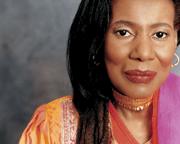 The passing of a great man’s widow is often taken as a second opportunity to mourn the man himself, but when Alice Coltrane, widow of the sax giant John Coltrane, died late last week, it was her accomplishments, and her spiritual path, that filled her obits. A jazz pianist and harpist–the latter putting her in some rare company–Alice Coltrane already had a busy career as a composer and performer by the time she met John Coltrane in the early 1960s. It’s been suggested that Alice, who eventually took McCoy Tyner’s place in John’s quartet, drove John to explore the outer limits of jazz.
The passing of a great man’s widow is often taken as a second opportunity to mourn the man himself, but when Alice Coltrane, widow of the sax giant John Coltrane, died late last week, it was her accomplishments, and her spiritual path, that filled her obits. A jazz pianist and harpist–the latter putting her in some rare company–Alice Coltrane already had a busy career as a composer and performer by the time she met John Coltrane in the early 1960s. It’s been suggested that Alice, who eventually took McCoy Tyner’s place in John’s quartet, drove John to explore the outer limits of jazz.
Certainly, she was the more intrepid spiritual explorer. Both Coltranes came from devout Christian households, but after meeting Swami Satchidananda, Alice’s music became a part of her discovery of the divine and Hinduism. Of her conversion, she said, “I felt I could serve in any way that God wished. If He wants you to do charity work or humanitarian work or however He wishes to utilize you, maybe just talking or giving musical concerts is fine.”
Coltrane did release several albums of Indian chant, with titles like “Journey in Satchidananda” and “Huntington Ashram Monastery,” but she served in other ways. In the mid-’70s she founded the Sai Anantam Ashram in Santa Monica, Calif., where, as Swami Turiyasangitananda and a follower of the Hindu saint Satya Sai Baba, she taught meditation.

